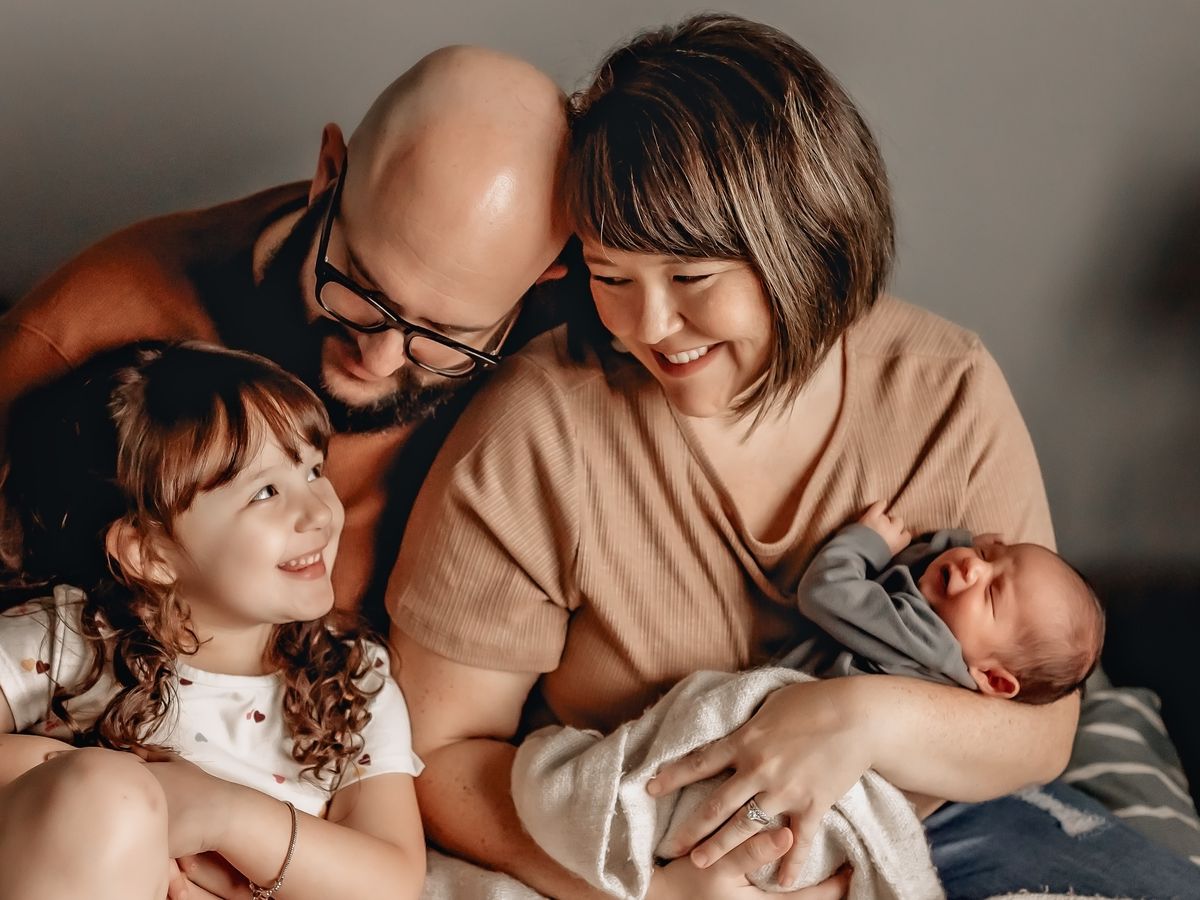- J
- L
I’m Aaron Monheim, a thirty-six-year-old husband to Whitney and father to Sloan (Five) and Cohen (8 weeks). I am trying to raise $35,000 to get a Hematopoietic Stem Cell Transplant to put my aggressive Multiple Sclerosis into remission.
When my daughter Sloan was born, a few delivery complications resulted in a quick NICU stay. Hovering over the incubator, terrified something horrible would happen to this beautiful girl, my life changed. I was 330 pounds and knew that if I didn’t change my life, I wouldn’t see my girl grow up. At that moment, I promised her I would do everything in my power to be there and be capable of walking her down the aisle at her wedding. After twenty months, I lost a total of 105 pounds.
A month after losing all that weight (October 2019), I was diagnosed with an aggressive form of MS called Highly Active Relapsing-Remitting Multiple Sclerosis (HARRMS). While I had been experiencing symptoms for almost ten years, MS can be difficult to diagnose – especially in male patients without risk factors. The first set of MRIs revealed fifteen lesions in my brain and another sixteen on the spinal cord. I was numb from the belly button-down, was in significant pain, and walked with a cane. I met with my first neurologist and started a disease-modifying treatment (DMT) requiring a daily injection within five days of diagnosis. As someone who was an athlete (I swam in college) and a competitive person, I thought that this was something I could mentally and physically push through – I quickly learned this doesn’t work and makes everything worse. Unfortunately, that first therapy did not work – I had two more relapses by the end of 2019. I fell at the grocery store from a new spinal lesion, and the second gifted me permanent double-vision from a new lesion on my right optic nerve.
At the start of 2020, I was referred to a new neurologist and started a different, highly-effective DMT. During the summer of 2020, I had a clinical relapse, and then in the spring of this year, MRIs confirmed new lesions and disease activity – confirming the second failure of a DMT in under thirty months. Since diagnosis, I have had sustained disease activity and continued to become more disabled. The Expanded Disability Status Score (EDSS) is a tool that is used to measure how disabled/neurologically deficient an MS patient is. The scale is from 0-10 – where zero represents no neurological impairment, and ten represents death due to MS. My EDSS is 4.5 when I am at “baseline” and more than 6.0 when symptomatic.
I am running out of effective treatments, but Autologous Hematopoietic Stem Cell Transplantation (HSCT) is remarkably effective. The hallmark aHSCT clinical trial, which put aHSCT up against the best available pharmaceuticals, consisted of 110 patients, with 55 in the HSCT group and 55 in the DMT group. After one year, only one patient in the aHSCT had any disease progression, versus 44 patients in the DMT group. The most inspiring was that patients who underwent aHSCT became less disabled by an average of 1.02 points versus patients on the DMT who became more disabled by an average of 0.6 points. At two years, three patients in the HSCT group had disease activity versus 54 of the 55 patients in the DMT group. Upon completion of the trial at five years, only twelve of the 55 patients who received HSCT had any disease activity. At ten years, just over 75% of the patients who received aHSCT were still free of any disease activity.
This treatment is so new for MS patients, and only one clinic in the United States takes patients outside of a clinical trial – the Colorado Blood Cancer Institute in Denver. I've been accepted as a patient, and the transplant is scheduled to start in January 2023. After pre-transplant MRIs in Spokane, I will move to Denver for twelve to sixteen weeks with my father, who will be my 24-hour caretaker.
The entire process can be separated into three one-month segments. The first month is outpatient and consists of transplant prep: placement of a central line, stem cell mobilization, stem cell collection, and pre-chemo antibiotic, antiviral and antifungal prophylaxis. The following month is the actual transplant. I’ll be admitted to the hospital for six days of high-dose chemotherapy – killing off my entire immune system and bone marrow. The next day, I’ll get an infusion of all the stem cells that were previously collected – this begins the process of building a new immune system that will hopefully no longer attack my brain and spine. I’ll remain in isolation for two to three weeks until it is safe for me to leave isolation. After discharge, I’ll go to the hospital daily to see the transplant doctor, neurologist, or physiotherapist until I have been cleared to travel home to Spokane.
The money I am trying to raise will help pay for medical expenses, housing for twelve to sixteen weeks in Denver, living expenses (food, etc.), travel, and rehab expenses. I am terrified to leave my wife and two children for three months to undergo a procedure that has roughly a 1 percent mortality rate. I am hopeful that with your help, this transplant will give me a new lease on life and allow me to fulfill my promise to be capable of, one day, walking my daughter down the aisle at her wedding.

